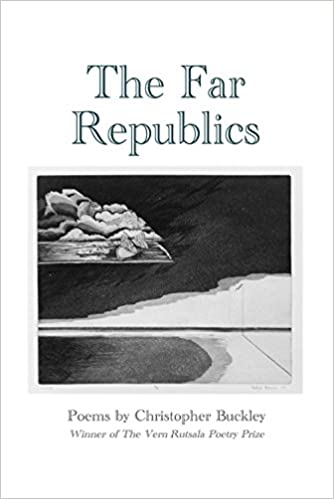Ryan Guth

by Christopher Buckley
Cloudbank Books
2017
$15.00
All of us, after a certain age – poets included – feel the need to take a backward glance, to rummage around in our own utterly unique collection of remembered people, sights and sounds, talismanic objects, watershed moments, and to savor again the richly blended emotions we attach to them. And there’s where the poet’s challenge lies. How do you make that personal curio cabinet of memories emotionally available to a reader? Which of one’s recollections will resonate for someone else the way they do for oneself? How much backstory is really necessary, and how little will it take to throw off or obliterate a delicate nuance of feeling?
Well over half of Christopher Buckley’s latest poetry collection is set in those “far republics” and he does catch, whole and breathing, some of its most luminous moments: as when “surfing Miramar point…
salt water and my blood rumbling
with the breakers, crouched in a glassy tube,
cutting across the lip to stall and shoot through
the curl again with a synergy of atoms and flying space.
Or, less dramatically, when the local WMCA has just closed (at the arbitrary and bureaucratic hour of 5:00 p.m.), leaving the speaker to sit alone “on the cement steps in front, watching the sky grow dark, waiting for my parents to collect me after work….” We don’t need a word more of exposition or description to catch that quiet hovering between boredom and relief from loneliness; everyone who’s been a child will recognize it.
Of course, not every page is filled with moments as perfectly judged as these. “Selected Poems,” for example, is primarily a coming-to-terms with the disappointing administrative and marketing exigencies of producing such a volume – subject matter guaranteed to interest only those of us who’ve ever contemplated such a thing. I know, of course, as Buckley does, that “95% of poetry doesn’t sell a lick anyway” (and I’m pretty sure the 5% that does sell was written by folks like McKuen, Nimoy, Jewel, and Suzanne Somers). But I continue to believe that poets owe their readers something that will connect with their own lives and feelings.
Also, the lists can go on too long: the series of names and places and brands whose mere mention obviously resonates for the speaker, but not always for us. Even there, though, he’s rightly privileging details of the moment over the expository set-up, if going a bit too far in the opposite direction. People, eateries, foods, destinations flash by, some of them sounding familiar from other poems in the book, some not, and I don’t always know how I’m supposed to use the information they contain and/or cross-reference. Maybe some of these memories are composites or montage. Or maybe the point is not the memory itself, so much as the blurring of it over the intervening decades. But I don’t get quite enough guidance to be certain.
Ironically, my own favorite poem in the book is not one from the “far republics” of the poet’s memory. It’s the one second from the end, “Working on the Patio at the End of Winter, I think of Po Chu-I.” Despite the James Wright title, the poem itself is pure Christopher Buckley, and of the best of him. There’s that attractively self-deflating candor:
I had to watch my step
to even end up in this back-water…
Other passages seems to borrow rhythms and cadences from stand-up comedy, that most American of art forms:
I put in regular hours
and now have to ask myself why
everything turns up too late?
Cash in my pocket and
I’m buying sparkling water
instead of champagne…
Then, of course, there’s the layout. I’ve enthused about Buckley’s drop-line technique elsewhere, but I’m more and more convinced it’s the best thing he’s got. Certainly it helps us hear the comedic timing in the lines above. But it’s supple and expansive enough to carry off any number of vocal effects, including the superbly orchestrated conclusion, where a dirt-plain description of evening suddenly and surprisingly rises to a lyric high note, then turns a second time – not, as we might expect, toward resignation, but another dry and understated punch-line (which may be a sort of resignation, come to think of it):
At the end
of the garden,
liquidambars are a black scrawl
against twilight.
I look up again,
and guess I’ll get somewhere
by dark.
If this reviewer might make a request of the author, he would very much like more of this. What the drop-line does, as Buckley uses it, is to aerate the longer poetic utterance which is his current tendency. The irregular breaking of the long lines creates something between a standard linebreak and an understood caesura, cordoning off phrases so that we read them both separately and together for additional effect (“At the end/of the garden”). That, along with the vastly increased number of end-stops and enjambments, creates a marvellously flexible medium, one which Buckley has clearly made his own. That there is only one of these in The Far Republics may be my only serious complaint about the book.
If you like retrospection, if you like a variety of free verse, open forms, and prose poetry – all well-crafted – if you have reached that “certain age” yourself and don’t mind an established author’s occasional self-indulgence, this book will appeal.
Ryan Guth teaches at Jackson State Community College. His first book, Home Truths, was reissued in 2018 by Transcendent Zero Press. His second collection, Body and Soul, was published by Lummox Press in 2015.

